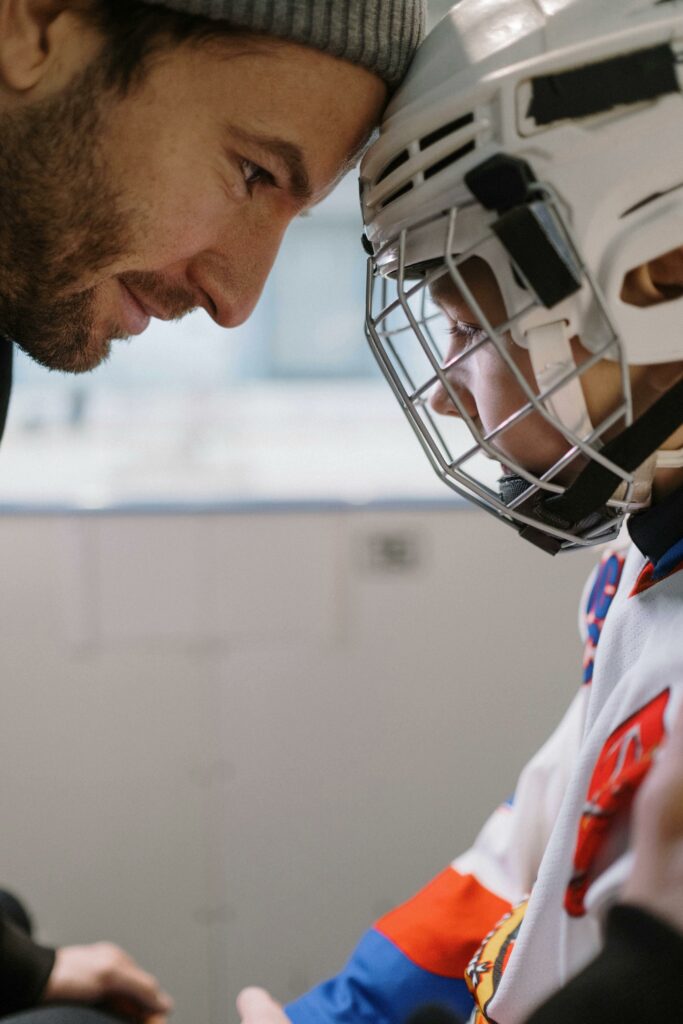Watching your young athlete struggle or fail in their sport can be incredibly difficult and emotionally draining. As a parent, it’s natural to want to protect your child from pain, disappointment, and setbacks. You might find yourself stepping in when things get tough, hoping to shield them from the harsh realities of failure. But this protective instinct, while well-meaning, can often hinder your child’s growth. Why is it so challenging to let them experience failure, especially when it’s a crucial part of their development and success?

What are the emotional challenges of letting go?
Fear of pain and disappointment: One of the main reasons parents struggle with letting their child fail is the fear of seeing them in pain. Parents want to shield their children from disappointment and heartache. When your child fails, it can feel like a reflection of your own shortcomings. This makes it difficult to step back and let them handle their own failures;
Desire for control: Many parents have a clear vision of success for their child, especially in sports. You might think that by taking control, you can ensure they achieve their goals. However, this desire for control can limit your child’s ability to learn from their experiences and develop independence;
Societal pressure: In today’s competitive world, there’s immense pressure on parents to raise “successful” athletes. You may fear judgment from coaches, other parents, or peers. The worry that your child’s failures will reflect poorly on you or affect their opportunities can be overwhelming;
Overprotectiveness: A protective instinct is natural for parents, but it can go too far. Shielding your child from every failure prevents them from developing resilience and problem-solving skills. They need to face challenges to grow and succeed in the long run.
Where do parents’ fears come from?
From your own failures! Let me explain:
Feeling like a “not good enough” parent: When your child fails, it can trigger your own insecurities as a parent. You might feel that their failures are a sign that you’re not a good enough parent. This fear can drive you to intervene too much, even when it would be better for your child to face the challenge on their own;
Reliving your own pain: Many parents project their past experiences onto their children. If you faced failures in your own life, you might fear that your child’s struggles will bring back those painful memories. This emotional response can make it even harder to let your child fail, as you are trying to avoid reliving your own pain through them.
Yes and what can we do, as parents, about it?
First of all: Accepting that it’s their life, not yours!
Take a Step Back: It’s important to remember that this is your child’s life, not yours. While you want the best for them, you need to take a step back and allow them to navigate their own path. This separation is crucial for their growth and independence (and for your own mental health!!!)
Be supportive, not overprotective: Support your child emotionally, but avoid being overly protective. They need the space to experience failure and learn from it. Your role is to guide and encourage them, not to shield them from every setback;
Be aware of your own mental health: Taking care of your own mental health is just as important. If you’re constantly stressed or anxious about your child’s performance, it can affect your well-being and your relationship with them (this is the last thing that we want). Your child needs a healthy, balanced parent to feel secure and supported. When you take care of yourself, you’re better equipped to handle the ups and downs of their athletic journey.
How to overcome the fear of letting them fail?
Shift your perspective on failure: View failure as a natural part of athletic growth. Instead of seeing it as a setback, see it as a chance for learning and improvement. Normalizing failure helps your child understand that it’s a stepping stone to success;
Focus on long-term growth: Your goal is to help your child become a capable, independent athlete. Allowing them to fail now, in a supportive environment, equips them with skills for future challenges and learn the keys to emotional coaching. This approach prepares you to create a winning environment. In a society that often values quick results, it’s essential to focus on long-term growth for your child. Achieving lasting success in sports—and in life—requires patience, dedication, and perseverance. Be patient and remind yourself that setbacks are part of the journey;
Kids are sponges—Be a Good Role Model: Remember that your children absorb your behaviors and attitudes. Your responsibility as a parent is to be a positive role model. Again, demonstrate patience, resilience, and a focus on long-term goals. Your child will learn these valuable traits by watching how you handle challenges and setbacks;
TRUST YOUR CHILD: Believe in your young athlete’s ability to overcome obstacles. Trust them to handle failure and learn from their experiences. This fosters confidence and self-reliance, which are crucial for success;
Provide support, not solutions: Offer emotional support and guidance rather than fixing things for them. Encourage your child to reflect on what went wrong and how they can improve. This helps them develop problem-solving skills;
Let go of perfectionism: Accept that your child doesn’t need to be perfect to succeed. Embrace their imperfections and allow them to grow at their own pace. Letting go of perfectionism makes it easier to let them experience and learn from failure.
Extra resources: How to Overcome Fear of Failure | Jim Kwik
Conclusion:
By understanding WHY it’s difficult to let your young athlete fail, you can shift your mindset and behaviour. Recognize that your fear of their failure may be rooted in your own experiences and feelings of inadequacy.ACCEPT that this is their life, not yours. Embrace a balanced approach where failure is seen as a valuable tool for growth. Take care of your own mental health and be the healthy, supportive parent they need. This will help your child become more resilient and better equipped to handle the challenges of sports and life!
so Why parents struggle to let their young athletes experience failure?

